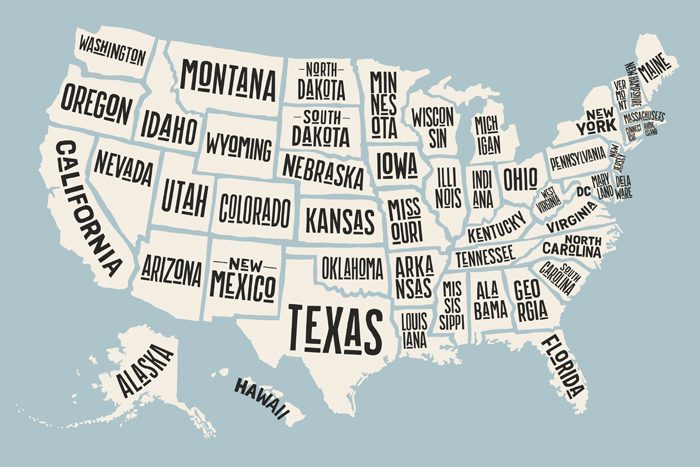Workers’ Comp and Paid Leave Legislative Updates in the South

It was a big year for workers’ compensation and paid leave legislative actions in the southern United States.
In workers’ compensation alone, eight different states enacted legislation with many states passing multiple laws.
A recent webinar from the Disability Management Employer Coalition (DMEC) dove into all the legislative actions regarding workers’ compensation and paid leave in the South that employers need to know about.
In Workers’ Comp
1) Florida
Effective: July 1, 2019
In Florida four different bills, house bill 23, house bill 301, senate bill 426 and house bill 983, will bring changes to workers’ comp.
House bill 23 will make it easier for injured workers to access telemedicine services. The law authorizes licensed healthcare professionals both inside and outside of Florida to use telehealth platforms to deliver their services.
While the bill doesn’t specifically mention workers’ comp, the bill will apply to the industry as well as regular medical care.
Fraudulent claims and changes to workers’ compensation policies for some first responders also saw legislative action in Florida.
House bill 301 tackled fraud in workers’ comp by issuing changes to the state’s coverage application. The application now indicates that workers’ compensation fraud is a third degree felony and the app no longer requires that applicants get sworn statements from employers and workers’ compensation agents notarized.
The final piece of legislation passed in Florida, senate bill 426, allows firefighters who have been diagnosed with certain types of cancer to receive disability, medical and death benefits in lieu of pursuing workers’ comp.
The bill will apply to 21 different types of cancer.
First responders will likely also receive additional benefits under house bill 983 which provided additional guidance for a piece of legislation passed in 2018 which allowed PTSD to be considered a workers’ comp injury without an accompanying physical injury.
2) Georgia
Effective: July 1, 2019
Georgia’s senate bill 135 made numerous changes to the state’s workers’ compensation laws, including increases to maximum disability benefits, increases to the maximum amount of money a worker’s spouse can receive after a workplace death and changes to some rules concerning non-catastrophic injuries.
Under this bill, the maximum amount of benefits an employee can receive for temporary total disability and temporary partial disability have increased.
For temporary total disability employees can now receive $675 per week and for temporary partial they can receive $450 per week up from $575 and $383 respectively.
“This was necessary because before this passage of this bill, the employer was not liable for ongoing medical treatment beyond 400 weeks,” said Desiree Tolbert-Render, assistant vice president, national technical compliance and workers’ compensation at Sedgwick.
In addition to changes to disability benefits, the law also increased the amount of death benefits a surviving spouse who is the sole dependent of the worker who passed away can receive. This increased from $230,000 to $270,000.
The bill also clarifies that for non-catastrophic injuries, the maximum period of 400 weeks for some treatments prescribed by an authorized physician will no longer apply for injuries that occurred after July 1, 2013.
Prior to the passage of this bill, an employer was not required to continue to pay for maintenance, repair, revision, or removal of medical equipment that was originally prescribed to an injured worker beyond 400 weeks.
This bill will remedy that in order to provide security for injured workers who need on-going treatment. For workers to qualify for continued payment, the item must have been originally prescribed or authorized by a physician within 400 weeks of the injury.
3) Louisiana
Effective: August 1, 2019
First responders and disputed claims saw legislative changes in Louisiana’s three workers’ compensation bills.
Senate bill 88 established a 45-day deadline to appeal decisions made by a medical director or associate medical director as part of a disputed claim and it is expected to improve the efficiency of the state’s medical treatment guidelines.
“The office of workers’ compensation in Louisiana, they did want a shorter deadline period, but this was the compromise,” Tolbert-Render said. “And hopefully this is going to improve the efficiency of the medical treatment guidelines operations.”
Workers’ compensation coverage has also been expanded to include benefits for reserve police officers and deputies who are injured during the line of duty while volunteering for a municipal or parish law enforcement agency under house bill 285.
Under this law, public entities may choose to provide workers’ compensation benefits to volunteer reserves or deputies using their own funds and at their own discretion.
The law prohibits volunteer reserve police officers from being compensated for injuries that occur during or as a result of their other employment.
The final bill, senate bill 107, follows Florida’s lead by making PTSD a compensable injury even without an accompanying physical injury for some public employees.
4) Maryland
First responders were in the spotlight in Maryland’s recent workers’ compensation legislation.
Three different laws in the state: senate bill 646/house bill 604, house bill 595 and house bill 795, all make changes to policies that affect first responders.
Both senate bill 646/house bill 604 and house bill 595 focus on cancer-related workers’ compensation benefits for first responders.
House bill 595 adds to the list of presumed cancers approved for workers’ compensation coverage and allows additional volunteer and fire rescue workers, instructors, life support workers, and fire marshals to qualify for coverage, while senate bill 646/house bill 604 clarifies the state’s laws by noting that first responders must have spent 10 years in their role, at any location, to qualify for benefits.
House bill 795 also targets first responders as the primary beneficiaries, but it only applies to the city of Baltimore. Under this law, deputy sheriffs are given an enhanced benefits status to match that of other law enforcement officials in Maryland.
5) Texas
Effective: September 1, 2019
Texas saw the most workers’ comp legislative actions of any of the southern states with six new laws on the books which will affect fee schedules, death benefits, and other areas of the industry.
House bill 935 affects fee schedules for injured workers who are treated at medical hospitals. Under the bill, the state’s fee schedule does not apply to federal, military hospitals and the reimbursement rate has to be the amount charged by the facility.
Unlike the other bills passed by Texas this year, this one will go into effect on January 1, 2020 and will apply only to services provided after that date.
Senate bill 2551 specifies 11 different cancers which first responders are presumed to have contracted through their line of work and are, therefore, eligible for workers’ compensation benefits.
In addition to these two bills, house bill 387 allows a treating doctor to delegate completing and signing of a work status report to a licensed advanced practice registered nurse which will help get injured workers’ back to work faster.
PTSD coverage was also passed in Texas. House bill 2143 amends the Texas Labor Code to allow coverage for PTSD among first responders.
The other two bills, house bill 1665 and house bill 2503, amends the state’s labor code to remove the requirement that hiring contractors fill out a division of workers’ compensation form and extends the payments of death benefits for life to the remarried spouse of first responders and peace officers, respectively
6) Alabama
Effective: January 1, 2019
Alabama passed one workers’ compensation bill this year and it follows the trend of extending benefits for first responders and their family members.
This bill will amend 2018’s house bill 192 to cover workplace deaths occurring on or after January 1, 2018.
The amendment clarified that death benefits in the state do not end upon remarriage of a spouse of a law enforcement officer or firefighter who was killed in the line of duty.
7) Virginia
Effective: July 1, 2019
Virginia saw two new pieces of legislation that will have an effect on the workers’ compensation industry.
The first bill, house bill 2022, amends the ability to delay the statute of limitations to file a workers’ compensation claim with an insurance company.
Under this law, employers have until the last day an employee receives workers’ compensation for lost wages or medical services to file a claim, so long as this date is no more than 6 months after the original accident.
The other piece of legislation passed in the state, senate bill 1729, prohibits a health care provider from filing a state workers’ compensation claim if they’ve received payment for their services from the federal Longshore and Harbor Workers’ Compensation act.
8) West Virginia
Effective: July 1, 2019
Employees of the Division of Forestry and those seeking workers’ compensation for occupational-related hearing loss will be affected by the changes to West Virginia’s new laws.
Senate bill 291 allows family members of Division of Forestry employees to collect survivor benefits if their loved one was killed while participating in disaster response.
Those seeking compensation for occupational hearing loss will no longer be required to have legal counsel when they are settling medical benefits. These changes will be enacted under senate bill 531.
In Paid Leave
1) Maryland
Effective: October 1, 2019
Ensuring that employees get leave for organ donation is the focus of Maryland’s new leave law.
This law requires that most employers provide their employees unpaid time off for organ and bone marrow donations.
“A lot of people might have assumed that this would just be covered by other laws, like ADA or FMLA, but not necessarily,” said Tasos Paindiris, partner at Jackson Lewis PC. “Many states have their own laws on this.”
The law gives employees up to 60 business days of job protected leave for organ donors and 30 business days of job protected leave for bone marrow donor. Health insurance benefits must also be maintained.
2) Washington D.C.
Effective: April 11, 2019
Like several states in the northeast region, Washington D.C. passed a law requiring accommodations, including leave, for victims of domestic violence. This law amends D.C.’s laws on discrimination.
The law doesn’t only protect leave for victims of sexual violence and their family members, it also requires company’s accomdate their needs. This can mean that employers have to transfer an employee, change their workstation or change their office phone number in order to protect them.
“Basically it’s a reasonable accommodation requirement for employees and family members who are victims of domestic or sexual violence,” Paindiris said. “It’s a pretty broad protection.”
3) North Carolina’s Servicemembers Civil Relief Act
Effective: July 25, 2019
This law will incorporate into North Carolina’s state law protections from the federal servicemembers civil relief act.
The federal law did not protect service members who were called to active duty within the state, so North Carolina passed protections for that.
4) Texas Paid Sick Leave Laws
Effective: Varies
While there were no state-wide changes to Texas’ paid leave laws, the state’s major cities have started to pass their own legislation. But they’re facing legal challenges.
Under Austin’s paid sick leave law, employers would be required to provide their employees with one hour of paid sick leave for every 30 hours worked.
The law isn’t currently in effect because in November of 2018, the court found that the law was preempted by the state’s minimum wage act. The case is currently before the Texas Supreme Court.
Dallas and San Antonio have similar paid leave laws that are also facing legal challenges. In Dallas’ case, litigation is pending while in San Antonio the law has been delayed by court order until December 1.
Trends to Watch
1) First responder coverages: A number of southern states have passed workers’ compensation legislation that specifically targets first responders and experts expect this trend to continue.
PTSD bills are becoming especially popular.
“In most cases, this is going to include first responders and owe to their type of work,” Dr. Paul Peak, PharmD and associate vice president of clinical pharmacy at Sedgwick said.
Both PTSD, additional coverages for cancers and additional death benefits for surviving family members.
2) Opioid Formularies: As the opioid epidemic continues to grip the country, some states are adopting opioid only drug formularies.
This is the case in Georgia, where the state is considering a formulary for opioid use only based on the official disability guidelines for opioid use. Other states may follow suit, as 13 states already have active or have adopted some form of prescription drug formularies. &

Click here for updates in the Northeast, West or Midwest.








